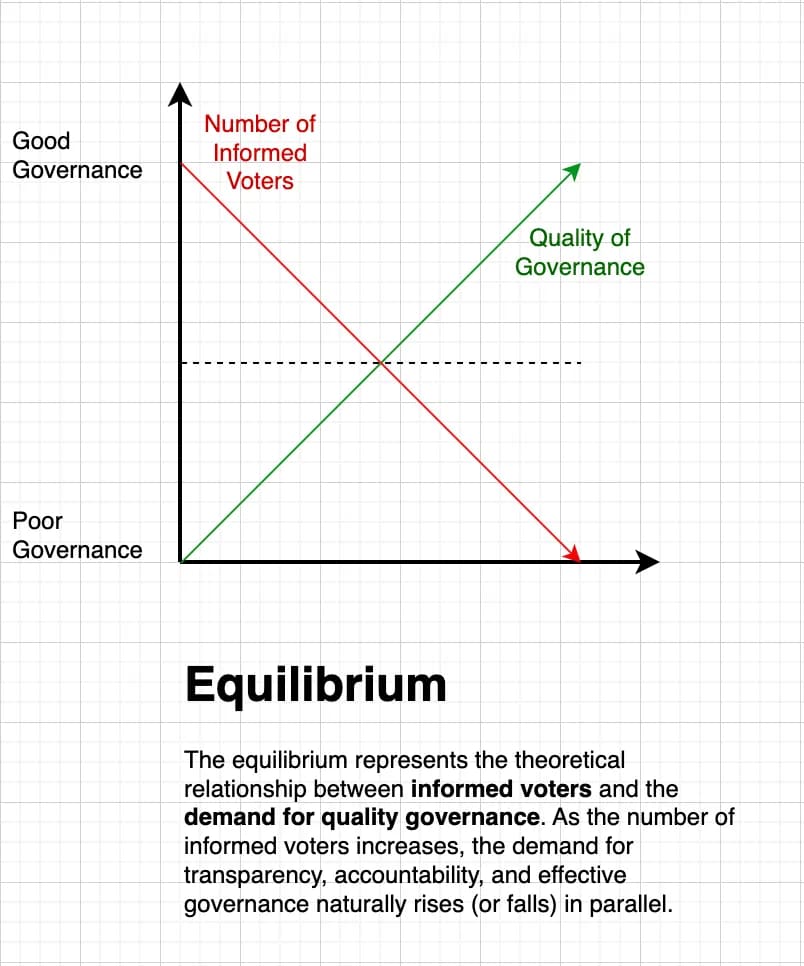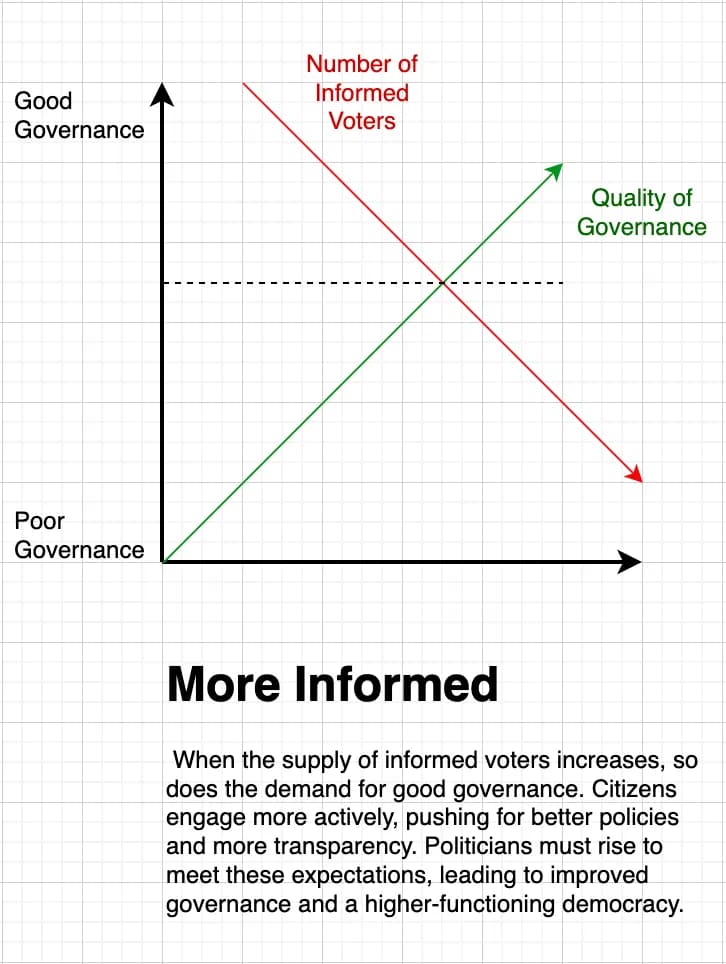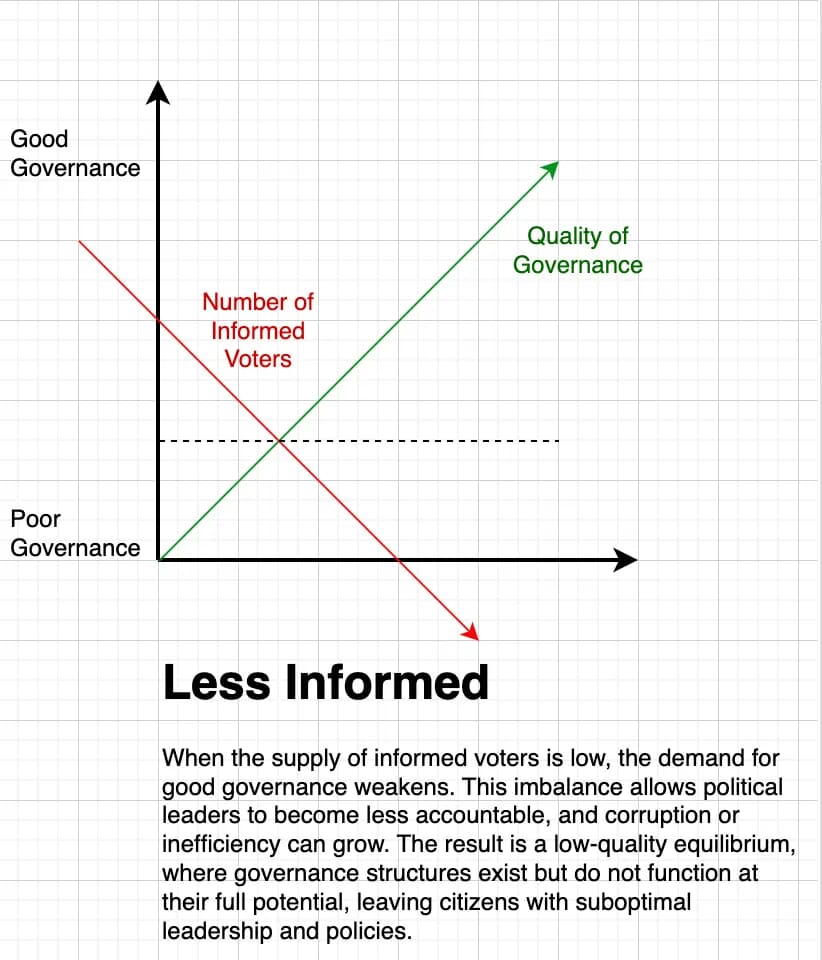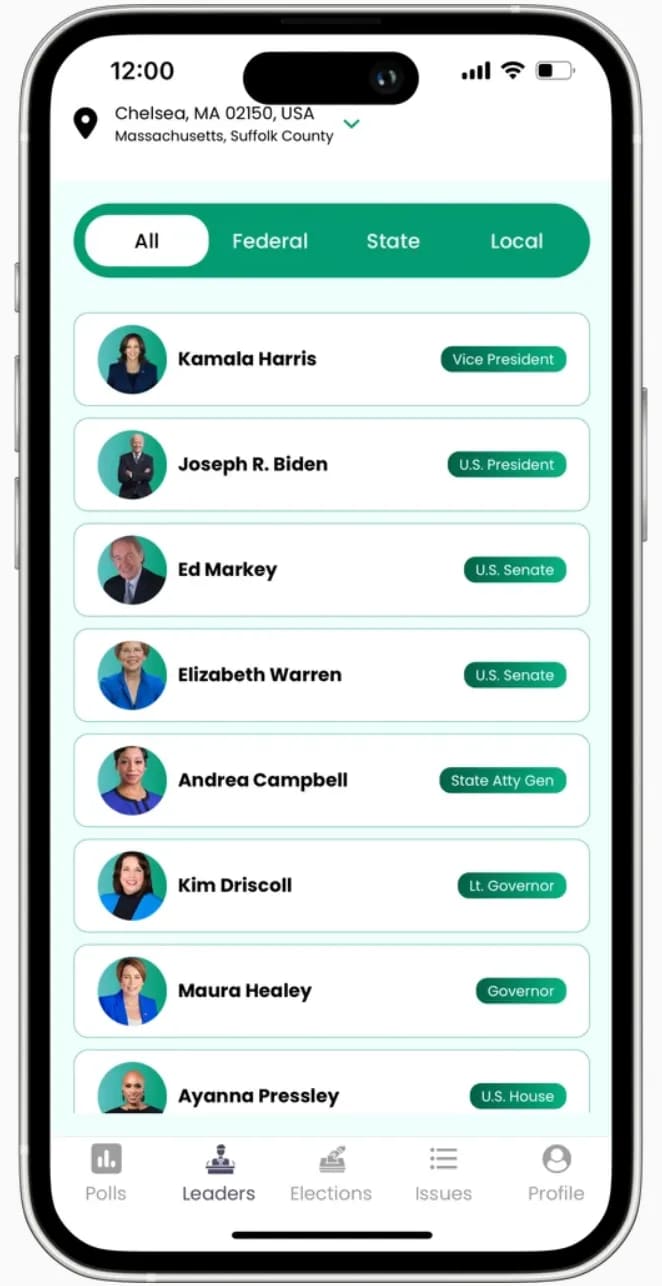



Technology
Author

Alexander
Nov 27, 2024
At its heart, democracy is a relationship — a two-way street between citizens and their government. And like any healthy relationship, its strength depends on active participation. One way to look at this dynamic is through the lens of supply and demand: with the supply being the number of informed voters and the demand being the quality of governance.
While this may sound like an oversimplification, it’s a powerful way to understand why some democracies thrive while others falter. When voters are well-informed and engaged, they place pressure on their government to deliver better governance. In short, the more informed the electorate, the higher the demand for effective leadership.
The Supply: Informed Voters

In this equation, the “supply” side represents the citizens — specifically, those who are informed and actively participating in the democratic process. These are the people who:
Understand the key issues at stake.
Know their representatives and what they stand for.
Engage in voting, attend town halls, and advocate for policies they care about.
The more informed voters there are, the stronger the electorate’s ability to critically evaluate leaders and hold them accountable. This isn’t just about showing up to vote — it’s about showing up informed, ready to make decisions based on facts and clear understanding.
Case in point: Case in point: Look at countries like Norway and Denmark, where voter turnout consistently exceeds 80% (IDEA Global Voter Turnout Database, 2023). These nations not only prioritize civic education but see the results: over 70% of their citizens can accurately identify their representatives’ positions on key issues (European Social Survey, 2022), and both countries consistently rank in the top 5 for government effectiveness (World Bank Governance Indicators, 2023).
The Demand: Good Governance

On the other side of this equation is “demand” — represented by politicians and governments. Ideally, the demand for better governance should come from the voters. When citizens are informed, they place greater expectations on their leaders to:
Create thoughtful, effective policies.
Maintain transparency and accountability.
Serve the public interest instead of private agendas.
When voters are engaged, politicians know they’re being watched. If they fail to meet expectations, they risk being voted out. The quality of governance improves when citizens apply pressure — it’s democracy working as intended.
The Problem: An Imbalance in the System

On the other side of this equation is “demand” — represented by politicians and governments. Ideally, the demand for better governance should come from the voters. When citizens are informed, they place greater expectations on their leaders to:
Create thoughtful, effective policies.
Maintain transparency and accountability.
Serve the public interest instead of private agendas.
When voters are engaged, politicians know they’re being watched. If they fail to meet expectations, they risk being voted out. The quality of governance improves when citizens apply pressure — it’s democracy working as intended.
Knowledge Isn’t Enough: Why Action Matters
It’s tempting to think that simply providing more information will solve these problems. But knowledge without action doesn’t drive change. You could know everything there is to know about your local candidates, but if you don’t vote, attend town halls, or engage with your representatives, that knowledge remains unused.
Here’s why the gap between knowledge and action persists:
Complexity: Politics can feel overwhelming. According to the Democracy Fund Voter Study Group, 64% of Americans avoid civic engagement not from lack of interest, but from feeling overwhelmed by the complexity of the political system. Of those who want to participate, 73% say they don’t know where to start or how to effectively engage (Harvard Kennedy School’s Democratic Governance Study, 2023).
Fragmented Information: Even when people want to be informed, the data they need is often fragmented or hard to access.
Apathy: Some citizens feel their participation won’t make a difference — especially when faced with systemic issues like gerrymandering or voter suppression.
In other words, access to information isn’t enough. Citizens need tools that make it easy to act on what they know.
Technology’s Role: Bridging the Gap Between Knowing and Doing
This is where technology can play a transformative role. Imagine a platform that doesn’t just inform voters, but empowers them to act. A tool that centralizes all the information citizens need — voting records, candidate profiles, and policy positions — and presents it in a simple, actionable format. Such a tool would:
Provide clear, reliable information on representatives.
Enable voters to engage directly with their leaders.
Make civic participation as easy as checking your phone.
By turning knowledge into action, technology can bridge the gap between citizens and their government. The impact of empowered voters is measurable: municipalities using digital civic engagement tools saw a 47% increase in public meeting attendance and a 31% rise in citizen-representative interactions (Aspen Institute’s Digital Democracy Project, 2023). Where these tools are implemented, voter turnout in local elections increased by an average of 23% (Stanford Digital Civil Society Lab, 2022).
Shifting the Democratic Equilibrium
If more people are informed and engaged, the entire system shifts. Political leaders know they’re being watched by a savvy electorate. They feel pressure to create better policies, be more transparent, and address key issues that matter to voters.
We’ve seen this play out in history — from the civil rights movement in the U.S. to pro-democracy protests in Hong Kong. When people demand better, the system responds. The challenge now is to make it easier for people to stay informed and engaged, even when the political landscape feels overwhelming.
“Never doubt that a small group of thoughtful, committed citizens can change the world; indeed, it’s the only thing that ever has.”
- Margaret Mead
Conclusion: Democracy as a Marketplace

Viewing democracy through the lens of supply and demand helps explain why some systems work better than others. The supply of informed, engaged citizens is crucial in driving the demand for quality governance. But knowledge alone isn’t enough — it must be coupled with accessible, user-friendly tools that turn information into action.
The good news is that these tools already exist. The challenge now is getting people to use them.
Call to Action: Bridging the Gap with Voter
One such tool is Voter, a mobile app designed to simplify civic engagement. Voter turns your phone into a personal political compass, guiding you through the democratic process with clear, actionable information. Whether it’s staying informed about your local representatives or voting on critical issues, Voter empowers you to participate meaningfully in your government.
Download Voter today and take the first step toward rebalancing democracy. Your voice matters, and Voter makes it easier to use.
Bibliography
Brennan Center for Justice. (n.d.). Voter Challengers. Retrieved from https://www.brennancenter.org/sites/default/files/legacy/publications/Voter_Challengers.pdf
Cobb Collaborative. (n.d.). The Importance of an Informed Vote. Retrieved from https://www.cobbcollaborative.org/the-importance-of-an-informed-vote
Großer, J., & Seebauer, M. (2016). The curse of uninformed voting: An experimental study. Games and Economic Behavior, 97, 205–226.
Melbourne Law School. (n.d.). The Challenge of Informed Voting Project. Retrieved from https://law.unimelb.edu.au/centres/errn/research/research-projects/the-challenge-of-informed-voting-project
Smith, R., Gauja, A., Kildea, P., & Keenan, M. (n.d.). The Challenge of Informed Voting in the 21st Century. Retrieved from https://law.unimelb.edu.au/__data/assets/pdf_file/0009/1555956/TheChallengeofInformedVotingFinalReport2.pdf
The Center for Growth and Opportunity. (2023). Does mandatory voting lead to more informed voting? Retrieved from https://www.thecgo.org/research/does-mandatory-voting-lead-to-more-informed-voting/
International Institute for Democracy and Electoral Assistance. (2023). IDEA Global Voter Turnout Database. https://www.idea.int/data-tools/data/voter-turnout
European Social Survey. (2022). European Social Survey. https://www.europeansocialsurvey.org/
World Bank. (2023). Worldwide Governance Indicators. https://info.worldbank.org/governance/wgi/
Pew Research Center. (2023). What Americans Know About Their Government. https://www.pewresearch.org/politics/
MIT Election Data and Science Lab. (n.d.). Local Election Turnout Database. https://electionlab.mit.edu/
Democracy Fund Voter Study Group. (n.d.). Research on Voter Behavior and Engagement. https://www.voterstudygroup.org/
Additional Academic Sources
Harvard Kennedy School. (n.d.). Democratic Governance Study.
Stanford University. (n.d.). Digital Civil Society Lab.
Aspen Institute. (n.d.). Digital Democracy Project.



